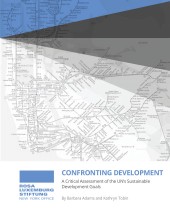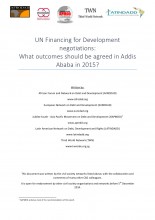n a new report released by Rosa Luxemburg Stiftung—New York Office, Barbara Adams and Kathryn Tobin give their take on the post-2015 process and suggest how various actors can intervene to shape proposed new goals. The Sustainable Development Goals will determine the global development agenda for years to come. They will affect not only the UN’s Secretariat, funds and programmes but each member state as well as non-governmental organizations and the private sector around the world. If processes converge to [...]
Nachhaltige Entwicklung und Menschenrechte
The second MenEngage Global Symposium was held in New Delhi, India, from November 10-13, 2014 and brought together more than 1200 activists and professionals coming from 94 countries. The outcome of the Symposium was the creation of the Delhi Declaration and Call to Action. This document presents the shared concerns of all participants regarding the gaps in the progress of the gender justice movement and, against this background, affirms the commitment of all parties to the continuous engagement of boys [...]
Following the release of the US Senate Intelligence Committee’s study of the CIA’s detention and interrogation program on December 9, 2014, two former UN Assistant Secretaries-General and UN Humanitarian Coordinators for Iraq, Hans von Sponeck and Denis Halliday, initiated a petition to start a judicial process against the violators of the UN Convention Against Torture and the Geneva Conventions. The petition, which has now become global through the campaigning of the Brussels Tribunal, an activist think tank and peace organization [...]
Economic valuation of nature
The economic valuation of nature has now been debated for several years, having already been implicit in the Kyoto Protocol that set targets for greenhouse gas emissions and provided the framework for trading CO2 equivalents. The role of nature in models to measure prosperity and of market-based instruments in nature conservation was discussed at a conference organised by the Heinrich Böll Foundation, Global Policy Forum and terre des hommes in Bonn, Germany, in November. Presentations and discussions at the conference [...]
The principle of common but differentiated responsibilities (CBDR) is considered one of the key achievements of the UN Conference on Environment and Development in Rio de Janeiro in 1992. Twenty years later, this principle has become a focal point of current negotiations on climate change and the post-2015 agenda. The developing countries that make up the Group of 77 want to preserve the principle unchanged. However, the US, EU and other industrialized countries want to do away with it in [...]
Of the people and for the people?
In a recent blog post, the Center for Economic and Social Rights takes a look behind the data ‘revolution’ and finds that high quality, accessible data – combined with important shifts in how we collect and use it – could certainly play a role in improving human rights enjoyment, empowerment and accountability. Indeed, CESR states that data can illuminate human rights problems and help to identify potential policy solutions. Not only does it provide and aggregate information about people, it [...]
What outcomes should be agreed in Addis Ababa in 2015?
2015 will be a landmark year for the global fight against poverty and for equitable and sustainable development, with three crucial summits in just six months. A central issue for all three summits is concrete proposals for reforms to international financial and trade systems so that they support the achievement of global sustainable development goals. Such reforms should be based on the right to development for all countries and ensuring economic and social rights for all. There are sufficient funds [...]
On September 19 2014, Global Policy Forum, in collaboration with MISEREOR, hosted an expert panel discussion that raised many strategic questions on the topic of financing the post-2015 sustainable development agenda and the sustainable development goals. Many of the answers to these questions depend on the outcomes of negotiations in the run up to the UN Financing for Development Conference in July and the expected UN Summit to pass a post-2015 agenda in September 2015. In the meantime, however, the [...]
"The debates on the Post 2015 Agenda offer the opportunity to reconsider development in light of the new realities and to overcome the old and often still paternalistic approaches of development policy. Therefore, a truly universal Post 2015 Agenda must not just become an updated set of MDGs. It should contain universal sustainability goals and a program for structural transformation which defines the necessary financial, regulatory and institutional means of implementation in all countries of the world, and this in [...]
The German NGO Forum on Environment and Development has sent an open letter to the Special Adviser of the Secretary-General on Post-2015 Development Planning, Amina Mohammed. The letter addresses the Secretary General’s synthesis report, which will constitute a major step in the elaboration of this new agenda and will reflect on the Open Working Group on Sustainable Development Goals' report, published in July. The NGO Forum welcomes that the OWG report addresses a series of important issues such as inequality [...]
Seitennummerierung
- Vorherige Seite
- Page 41
- Nächste Seite


